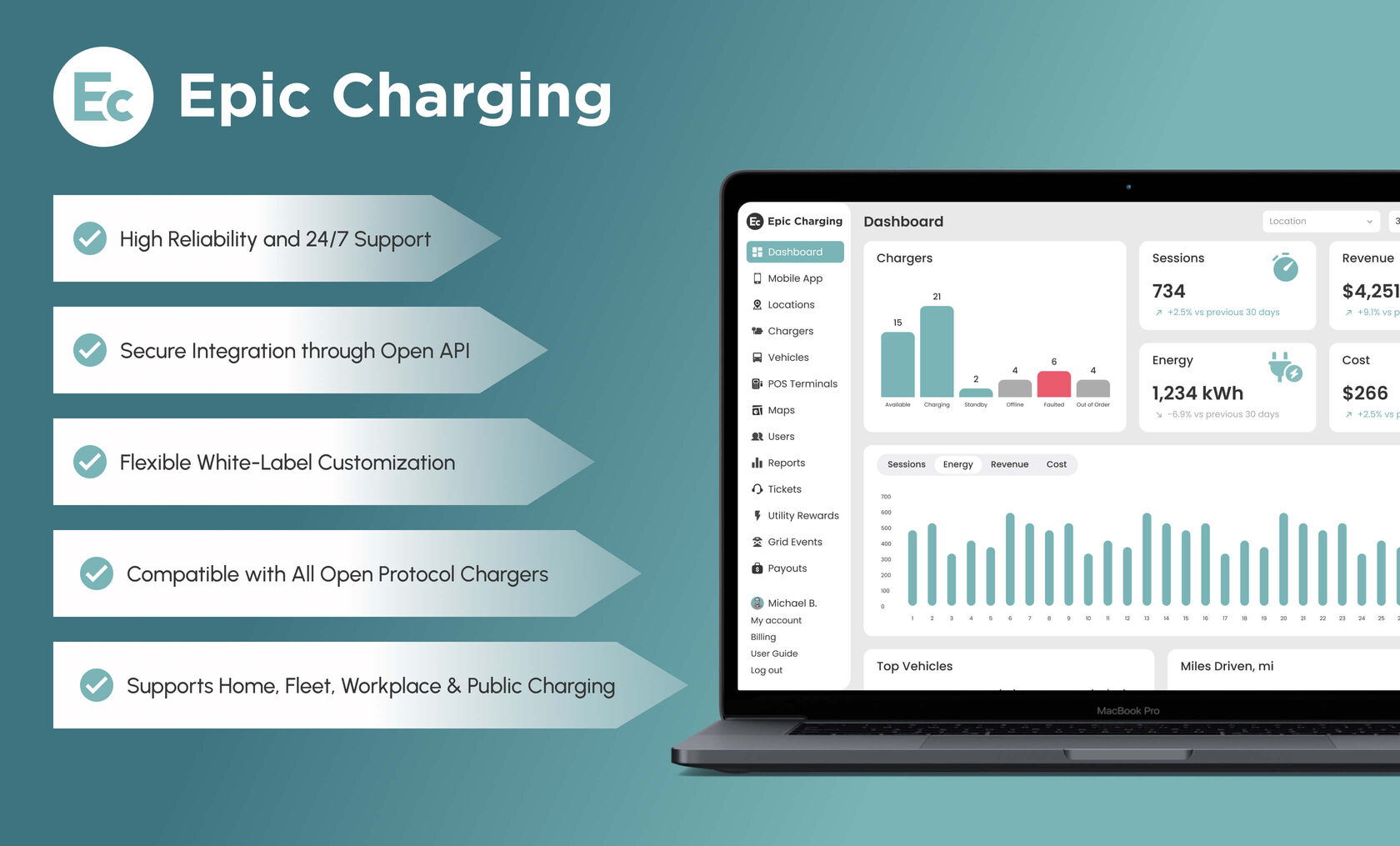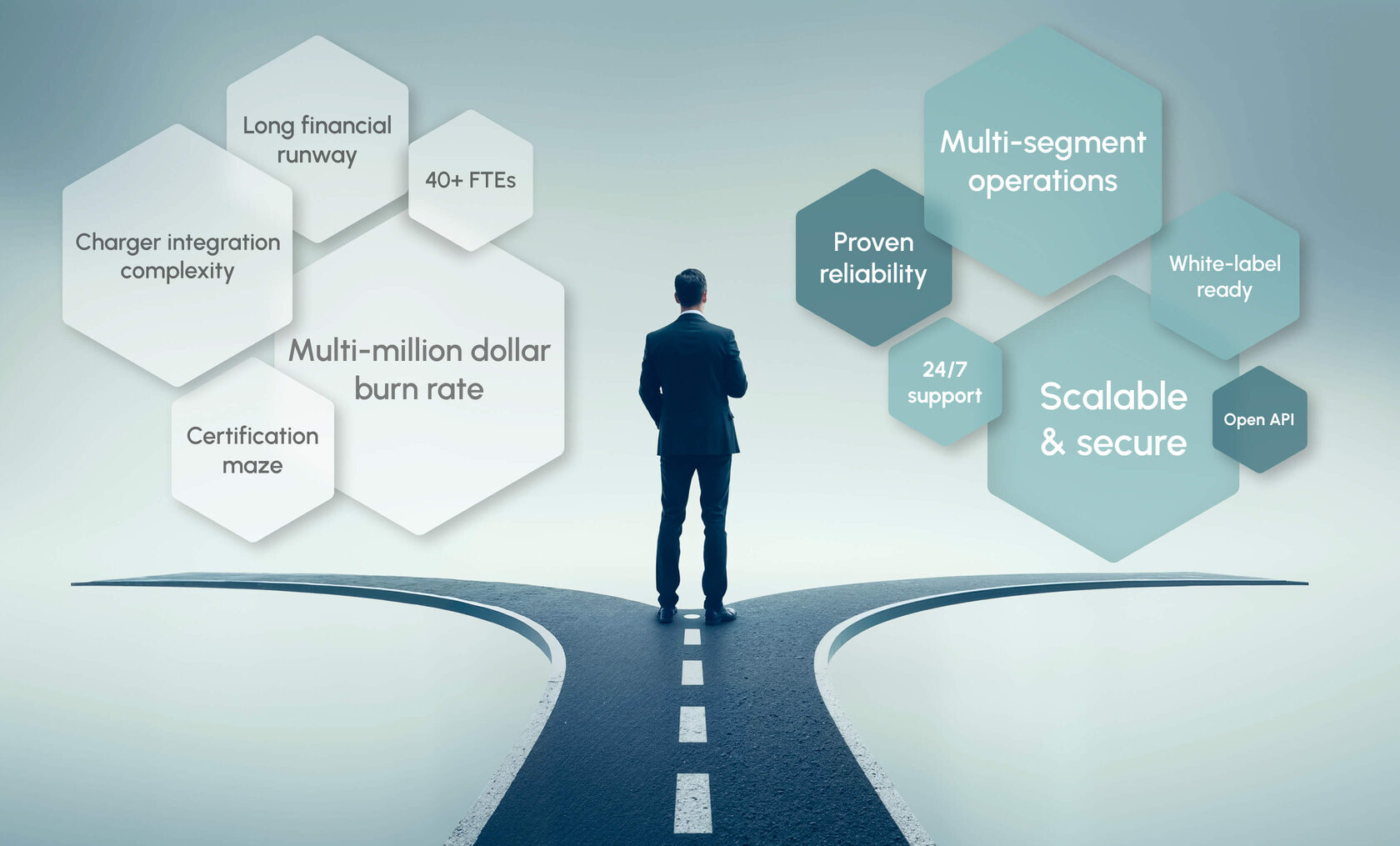You’re at a crossroads. It’s time for a new charge point management system (CPMS) that allows you powerful real-time monitoring and management of your EV charging network. But should you build your own or buy an existing one? The former offers a tempting prospect – the notion that custom-building a new CPMS from scratch will result in a superior level of control and authenticity compared with third-party EV charging software like that provided by Epic Charging. But is this the reality? To answer that, let’s first consider some facts.
What It Takes to Build a CPMS
Even for well-capitalized companies, launching a proprietary CPMS is a considerable undertaking. First, you’ll need to source a dedicated engineering team of five to seven people with experience in both front-end and backend software development, not to mention DevOps to coordinate shared responsibility between development and operations personnel. You’ll also need a project manager, mobile app engineers, a designer and a quality assurance team. For starters. At scale, the CPMS development team size is typically in the range of 40 to 60 full-time employees.
Second, you’ll need to set up a physical lab to integrate and test the CPMS with current charging hardware and equipment such as credit card readers, EV telematics, load controllers and more. A market saturated with hundreds of EV charger models means your team will need ample time and resources to validate firmware updates and connectivity under real-world conditions.
These essential steps entail the acquisition of certifications that are both expensive and time-consuming, including (but not limited to) SOC 2 to ensure the safe and effective management of all customer information; OpenADR to comply with North American energy management standards; and CTEP or NTEP to administer payment processing. Moreover, integration with utility programs requires local knowledge, regulatory navigation and, quite often, months of additional certification work. Next, consider a CPMS normally operates as a B2B2C model – serving both businesses and EV drivers – which invariably necessitates a robust support network.
The result is a multi-million-dollar burn rate to build a reliable, scalable CPMS with critical functionality like remote operation, billing and payment, user authentication, load management, fault detection and data analytics capabilities. And that doesn’t factor in the costs of ongoing support and maintenance, feature updates and customer onboarding. Even with a lean, efficient team, we estimate you’d need to scale somewhere around 20,000 EV charging ports just to break even. Companies like Epic Charging, ChargeLab and AmpUp serve as examples of what it takes to accomplish such a feat, having already invested millions of dollars to do these things.
Questions to Ask Before Building
Let’s assume you’re still considering custom-building your own CPMS despite the daunting nature of such a task. Stop and ask yourself three key questions first.
1) Is software development my core business or just a side venture?
The fact is most hardware or service companies that attempt to build their own software fail. Examples abound across industries, from Xerox to Motorola to GE Digital. A few outliers like Apple and Tesla are exceptions, but even then, as in Tesla’s case, CPMS dashboards commonly offer only the most basic functionality. History has demonstrated that dabbling in software development is a quixotic quest that leads to wasted efforts, burns critical working capital, detracts from a company’s core mission, and usually results in inferior software products.
2) Do you have access to top industry talent and technology?
Access to superior technology, automation techniques and strategic planning practices is crucial to efficient execution and reduced costs. Ask yourself to what extent you’re able to maximize cloud computing, virtualization and flexible resource management; leverage high-tech hubs such as Silicon Valley or offshore development and manage remote teams; automate workflows to improve efficiency and accuracy; and regularly review network performance for ways to optimize.
3) Can you afford to operate at a loss for several years while you scale?
The excessive price tag associated with building out a viable CPMS will likely demand a long financial runway, a cost management plan that prioritizes expense-cutting, and a lot of faith. Sustained losses may eventually impact the quality of your main product or service, leading to customer attrition and a tarnished brand image – trade-offs that seem unwise when viable market alternatives exist.

A Smarter Alternative: Buying with Control
If you’re serious about launching (or growing) your EV charging business, the good news is you don’t need to build software from scratch when companies like Epic Charging have already scaled that Everest for you. Instead, you can focus on your strengths, like site acquisition, permitting, hardware selection, installation and financing.
When selecting a backend partner, make sure they possess a deep understanding of your market, maintain a local presence in your geographic area, and can adapt to your corporate culture. Proven experience with migrations at scale and multi-segment operations such as fleet, workplace and multi-family properties is paramount. In addition, the EV charging software should allow you to create your own dashboards and integrations using open APIs that meet the ever-changing needs of your operations team. And your partner should offer 24/7 support that can perform rapid troubleshooting to minimize service interruptions.
If you’re serious about launching (or growing) your EV charging business, the good news is you don’t need to build software from scratch when companies like Epic Charging have already scaled that Everest for you. Instead, you can focus on your strengths, like site acquisition, permitting, hardware selection, installation and financing.
When selecting a backend partner, make sure they possess a deep understanding of your market, maintain a local presence in your geographic area, and can adapt to your corporate culture. Proven experience with migrations at scale and multi-segment operations such as fleet, workplace and multi-family properties is paramount. In addition, the EV charging software should allow you to create your own dashboards and integrations using open APIs that meet the ever-changing needs of your operations team. And your partner should offer 24/7 support that can perform rapid troubleshooting to minimize service interruptions.
When you reach a certain scale, you’ll also want flexible white-label customization options that allow you to control the customer experience, either by building your own mobile app or white-labeling one that connects to a proven backend EV charging API or OCPI.
The bottom line is that building a CPMS isn’t just a technical challenge; it’s an onerous long-term strategic commitment. Alternatively, buying offers most EV charging businesses a fast, reliable and flexible CPMS that gets them out of the software development business so they can focus on doing what they do best.
Want to know more? Click here to learn how our EV charging software can help power up your business.
The bottom line is that building a CPMS isn’t just a technical challenge; it’s an onerous long-term strategic commitment. Alternatively, buying offers most EV charging businesses a fast, reliable and flexible CPMS that gets them out of the software development business so they can focus on doing what they do best.
Want to know more? Click here to learn how our EV charging software can help power up your business.
Originally published by Epic Charging on EV Charging Summit Blog

